A Libyan No-Fly Zone Won’t Stop Gaddafi
Establishing a no-fly zone in Libya won't stop the Civil War, and it's likely to draw the United States further into a conflict that it needs to stay out of.
Jake Tapper reports that at least one Obama Administration official is publicly admitting a rather obvious fact:
U.S. Ambassador to NATO Ivo Daalder in a call with reporters Monday said that “the kinds of capabilities that are being used to attack the rebel forces and, indeed, the population will be largely unaffected by a no-fly zone,” Daalder said.
Daalder was not going rogue; he was voicing the skepticism many Obama administration officials have about the efficacy of the push.
Said one administration official to ABC News: “we can save many more lives with humanitarian relief and other efforts than through a no-fly zone.”
US officials say there was a significant decrease in both fighter and overall air activity over the weekend and, as Daalder put it, “the overall air activity has not been the deciding factor in the ongoing unrest; just as you stated, other things are really determining what’s happening on the ground.”
He underlined that “it’s important to understand that no-fly zones are more effective against fighters, but they really have a limited effect against the helicopters or the kind of ground operations that we’ve seen, which is why a no-fly zone, even if it were to be established, isn’t really going to impact what is happening there today.”
I’ve been making this point for awhile now. A no-fly zone would likely mean an end to the Libyan Air Force bombing supply depots and civilians, but it would do little stop helicopter attacks, and nothing to stop Gaddafi from using tanks and artillery, including potential use of artillery armed with chemical weapons. The biggest problem with a no-fly zone from the U.S. perspective, then, isn’t the risks we’d face in imposing it, although those should not be discounted, but that it will draw us further into the conflict. Once a no-fly zone is secured and it becomes apparent that Gaddafi isn’t going anywhere, the public pressure to “do something” to stop him from attacking the rebels using conventional means will become greater. Moreover, that first step of intervention would likely create the impression among the rebels that we’re willing to do more, even if we’re not, thus leading them to take greater risks than they might otherwise take in the belief that the U.S. and NATO will come to their rescue.
Moreover, as George Friedman notes today at Stratfor, once we are involved in Libya, the odds that we’ll be able to extract ourselves quickly even when it’s over are pretty slim:
Having toppled a regime, it is difficult to simply leave. The idea that this would be a quick, surgical and short-term invasion is certainly one scenario, but it is neither certain nor even the most likely scenario. In the same sense, the casualties caused by the no-fly zone would be unknown. The difference is that while a no-fly zone could be terminated easily, it is unlikely that it would have any impact on ground operations. An invasion would certainly have a substantial impact but would not be terminable.
Stopping a civil war is viable if it can be done without increasing casualties beyond what they might be if the war ran its course. The no-fly zone likely does that, without ending the civil war. If properly resourced, the invasion option could end the civil war, but it opens the door to extended low-intensity conflict.
There is clearly a humanitarian crisis going on, and providing aid and assistance to the refugees that have flooded to Tunisia and Egypt in the wake of the conflict is certainly a good idea. But wars should not be fought for purely humanitarian reasons, they have to be fought with the national interest in mind and, in this case, our national interests argue strongly against stepping even a single foot into what is already a bloody and confusing conflict.
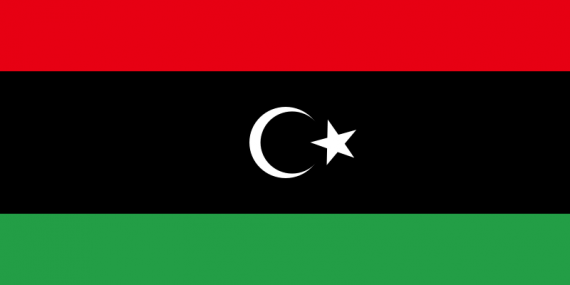

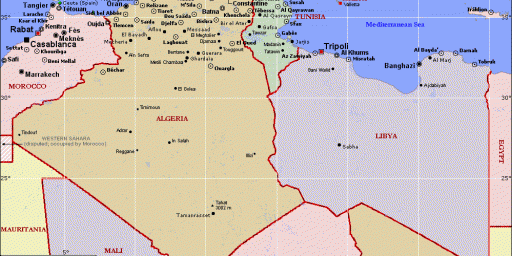
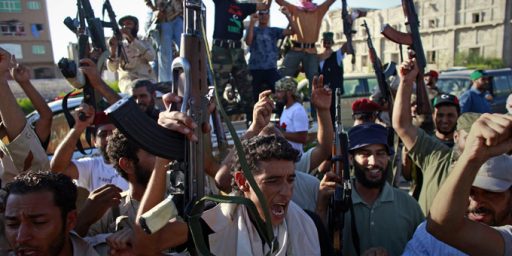

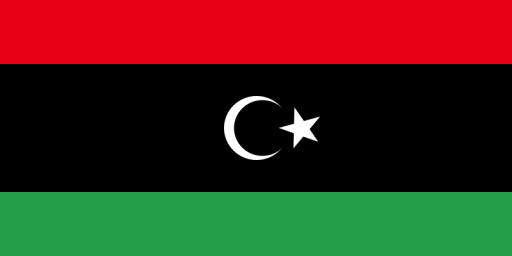
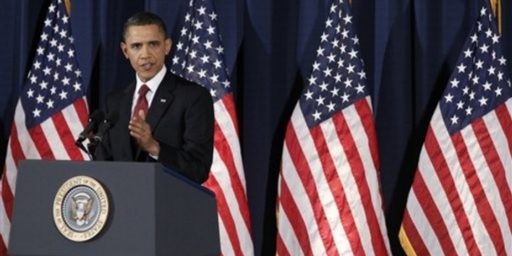
You’re mostly correct – A NFZ could stop helicopters, but that wouldn’t be enough.
I hope Obama doesn’t try to arm the rebels under the table, Iran-Contra style.
I hope you liberals are forced to watch the murder of the Libyan people. Funny what the left will put up with by those who hate us. Real Presidents take real action. Obama has photos of him and his buddy Gaddafi. What would you expect. Doug, you are so wrong about the effects of a now fly zone. It would stop air attacks which is something the rebels cannot contend with.
Why is it that the world and the US news media seem to be waiting breathlessly for Obama and the USA to do something about Libya … like they waited for us and Egypt. Obama should tell the world, “We propose that the Italians establish the no fly zone and we’ll supply the inspiration.”
“Real Presidents take real action. ”
Slaughtering tens of thousands of innocent brown people really isn’t a positive action, Wiley.
It’s an anger management problem.
ponce, How would you feel if a no fly zone saved thousands of those innocent brown people?
Doug, If a no fly zone is ineffective why did we impose one upon Iraq? Air power certainly has advantages and taking that away as a humanitarian action seems to be good thing by many people. A NFZ also encourages the rebels and, more importantly, discourages Gaddafi supporters. It could bring this thing to quicker end.
I’m not claiming to know what the right answer is but asking the right questions gets us to the right answer.
Steven, here’s a bit of wisdom for you: “Amateurs study tactics. Professionals study logistics.”
Our no-fly zones over Iraq were possible because of a multitude of factors that simply don’t apply in Libya.
1) We had secure bases in adjacent countries from which to fly — Saudi Arabia, Kuwait, and Turkey. Not the case in Libya.
2) We had significantly degraded Iraq’s anti-aircraft systems in the 1991 war, and kept them from rebuilding them. Libya still has its anti-air defenses, meaning that they can deny us the use of their airspace almost as well as we can deny it to them. At best, no one flies over Libya. At worst, we start losing planes and pilots in significant numbers as Libya starts using its own aircraft as “bait” to lure our fighters into SAM traps.
3) We had at least two carriers off Iraq’s coast to supplement land-based aircraft. We had to scrape and scrounge to come up with one — the 50-year-old Enterprise — even in the vicinity. And carrier air wings are smaller now than they were back when we were enforcing the Iraqi no-fly zone.
4) Enforcing a no-fly zone is not simply shooting down any enemy aircraft that get aloft. It also means aggressively attacking any air defense systems that even try to engage our aircraft. That means we start using bombs and missiles and guns in significant numbers on Libya’s ground forces, and put our pilots at significant risk in doing so. Anti-aircraft defense suppression — “Wild Weasel” — missions are arguably the most dangerous work for pilots — they have to actively put themselves out to be attacked from the ground, evade that attack, and hit back. We lost a LOT of good men in Viet Nam playing that game. Also, remember Serbia bringing down a Stealth fighter?
One thing in our favor: Libya’s upgraded a lot of its anti-air defenses from old Soviet equipment to more modern, Western systems — especially French. So we might have some inside info on how to best counter it. But if France — or Germany or England — does supply us with that kind of intelligence, that could put a major crimp in future arms sales, and they aren’t that likely to do that.
“Enforce a no-fly zone” is an easy solution to propose, a hell of a lot tougher to actually deliver.
J.
Is Wiley volunteering to suit up and fly patrol over Libya himself? Or is he suggesting he’ll accept a tax increase to pay for it?
Maybe he’ll assist by slapping a yellow ribbon on his truck while others do the dying.
Ben wins this thread.
Northern Libya was one big no fly zone back in April of 1986.
Two Carrier groups with Air Force support managed to pull it off for one night.
And now the same folks griping about the deficit they cheered on originally want to make it a permanent fixture?
Seriously? For how long? Six months? A year? Or as recent history tells us, over 8 years?
We should consider dropping the War on Terror and instead invest our resources on a War on Ignorance.
Ben, Are you suggesting citizens not be allowed to discuss war unless they are willing to volunteer? If that’s the case should we also limit the discussion of taxes to only taxpayers? I have to disagree with Neil. Trying to limit discussion does not win the thread.
Jay, I see your points and appreciate your input. What about bombing runways or using cruise missiles to do the job? Again I would only suggest this if it could help bring an end to Gaddafi.
@ Davebo: I don’t think we can win a war on ignorance. Ignorance may be the only nation that has an army bigger than China’s.
Another point that bears mentioning is that the British, Turkish, French, and Italian air forces together or in some combination are capable of implementing a no-fly zone over a sizeable area of northern Libya without our assistance. It would be a strain on their resources but that’s to be expected without the excess capacity we’ve invested in.
Over the years I’ve been skeptical of that excess capacity and I remain so. Frankly, I’d like to see our NATO allies develop some excess capacity of their own to deal with situations like this.
Actually, if we we get NATO on board, this is something that might be worth doing. Gaddafi has murdered Americans, and murdered and tortured his own people. And the potential for oil supply disruptions is a pretty serious threat to our already damaged economy. The people of Libya have shown they are ready to lay their lives down for freedom. That’s a much higher bar than the people of Iraq ever cleared before we went in over there. Could the American Revolution have succeeded without help from France?
“Actually, if we we get NATO on board, this is something that might be worth doing.”
Seriously? NATO should switch from preventing a Soviet invasion of Western Europe and concentrate on a no fly zone in North Africa? I was against it but at least Kosovo was on the same continent.
Steve, I just re-read my comment and realized my opening line came across as a bit snotty. My apologies — I really don’t like being that way inadvertently. I much rather save it for when I really want to use it, and it wasn’t called for here.
Now, for your idea of just taking out runways and airbases, I see two problems. First up, Libya’s currently using mainly helicopters for counterinsurgency work, and they don’t really need runways and airbases. They’re very convenient, especially for refueling and rearming, but not critical. Shutting down Libya’s (I should say Khadaffi’s, but I could never find one consistent spelling for his name, and that’s always bugged me) fixed-wing air force would help, but not much.
Second, there’s a fancy legal term for that; it’s called “act of war.” That’s one very wide Rubicon to cross, and we should be absolutely certain we want to.
Which brings us to problem 2B, the War Powers Act. Obama could do that, but he’d be limited to 90 days of enforcement before he’d have to get Congressional approval — and I doubt there’s much stomach there for essentially declaring war on/in a third Muslim nation right now.
I’ve despised Muammar for a couple of decades now, and would love to see him gone (preferably in several small pieces), but it just ain’t that simple.
J.
“ponce, How would you feel if a no fly zone saved thousands of those innocent brown people?”
Steve,
If our air campaigns in Afghanistan and Iraq are any indication, our planes would kill far more brown people than they saved.
And it wouldn’t stop Gaddafi.
> Seriously? NATO should switch from preventing a Soviet invasion of Western Europ
NATOs original mission ended over 20 years ago. Maybe it’s time to find something useful for it to do.
It’s not accurate to say A Libyan No-Fly Zone Won’t Stop Gaddafi We don’t know if it will or won’t. It might have no effect. Or it might break the government’s will. Or any number of things in between.
It is accurate to say that this is more complicated than just declaring a no-fly zone. We’ll be blowing up AA sites, and Gaddafi being Gaddafi could quite easily decide to ring each missile battery with picturesque orphans.
It’s also accurate as Dave says that we are not the only people with planes. Presumably the rest of NATO — again, especially, one hopes, the Turks — could lend a hand.
This is not an easy decision to make. We don’t know what intel the president is seeing, and we don’t know if that intel is reliable or another Curveball.
“Presumably the rest of NATO — again, especially, one hopes, the Turks — could lend a hand. ”
Do we even know what the rest of NATO wants? Seems to me that there’s quite a lot of bold assumption going on regarding the opinions of Turks, Spaniards and Italians, all of whom have a substantial stake in what happens with Libya by virtue of geography and direct energy needs.
What lesson should be learned from the fact that Europe’s worst atrocity since the Second World War – the massacre by Serbs of Bosnian Muslims at Srebrenica – occurred beneath a no-fly zone? – George Will
Hey, what happened to “we’re broke”? We’re supposed to shut down this country, let our roads and bridges and dams crumble away, throw children and seniors off medical care, wipe out pensions, destroy social security, eliminate food safety inspections, close prisons, fire teachers, close schools, decimate police and fire departments and end just about every government operation because we have no money, so it’s absolutely necessary that anyone who isn’t a billionaire suffer tremendously. That’s what all you “grown ups” on the right keep screaming at me.
And now you want to throw uncountable billions into a civil war in yet another Middle Eastern country.
How are we going to pay for this, grown-ups? Are we finally going to tax rich people? Oh, wait, that’s theft.
So what’s your plan for paying for this invasion you so desperately lust for? And how much more will the poor and middle class have to give up for yet another foreign adventure?
wr,
Who’s lusting for an invasion? We’re (the grown-ups) talking about what might be done to stabilize the country and save lives. And no, we’re not letting roads and bridges crumble. Cancel the high speed rail programs if there’s no money for bridges.
Do we believe in freedom and democracy? It’s complicated mess over there but waffling like we are doing is making things worse rather than better. Ranting like an undergrad in a coffee house contributes little to the conversation.
Hmmm, how does a real president react when a dictator slaughters his own people? From Wiki, but Powers book is better but not online.
“The al-Anfal Campaign (Arabic: حملة الأنفال), also known as Operation Anfal or simply Anfal, was a genocidal[3] campaign against the Kurdish people (and many others) in Northern Iraq led by the Iraqi regime of Saddam Hussein and headed by Ali Hassan al-Majid. The campaign takes its name from Surat al-Anfal in the Qur’an, which was used as a code name by the former Iraqi Baathist regime for a series of systematic attacks against the Kurdish population of northern Iraq, conducted between 1986 and 1989 and culminating in 1988. The campaign also targeted other minority communities in Iraq including Shabaks and Yazidis, Jews, Gays and Mandeans and many villages belonging to these ethnic groups were also destroyed…….
Thousands of civilians were killed during the anti-insurgent campaigns stretching from the spring of 1987 through the fall of 1988. The attacks were part of a long-standing campaign that destroyed approximately 3000-4000 Kurdish village in areas of northern Iraq and displaced at least a million of the country’s estimated 3.5 million Kurdish population. Independent sources estimate 1,100,000 to more than 2,150,000 deaths and as many as 860,000 widows and an even greater number of orphans.[5]”
What could possibly go wrong initiating a limited war with an Arabic country?
Steve
Plunk — I do believe in freedom and democracy — and I believe it starts in our own country. While they right is busy trying to pass laws to keep college kids from voting specifically because they tend to vote against Republicans, while the right is trying to end the ability of working people to freely assemble to negotiate wages and living conditions, while the right is trying to bankrupt the middle class to throw money at the super-rich, you claim you stand for freedom and liberty because you want to blow up people in yet another foreign adventure.
Of course, you completely refused to answer the question. What do we cut from the budget to pay for our great crusade for democracy in Libya?
I don’t see how a protracted Libyan Civil War, or the survival of the Khaddafi Regime is in the U.S. national interest. Or in NATO’s interest, either.
There is an opportunity here to unite world opinion against a dictatorship that has proven it is willing to slaughter its own people to stay in power. This could be a way for the U.S. to actually improve its image with the moderate Arab street. I think we all agree this would be a good thing.
If we can arrange the aerial battlefield in a way that the rebels would only have to deal with the helicopters, doesn’t that increase their chances to topple Khaddafi? Obama has already gone public against him, we’d better make sure this happens, should we?
This conceivably could be accomplished without one American boot on the ground.
> And no, we’re not letting roads and bridges crumble. Cancel the high speed rail programs if there’s no money for bridges.
Yea, why should we have decent alternatives to highways? The money was much better spent building infrastructure for Iraq, a nation that sits on an ocean of oil…
Still no word from the brave wannabee invaders how we pay for our next overseas adventure. I’d say we could slash money for the Special Olympics, but Republicans have already done that to fund tax cuts for themselves.
In all this keep in mind that the Serbians were able to shoot down some of our aircraft including the then new f117 which was shot down with an outdated missile system built in 1963….